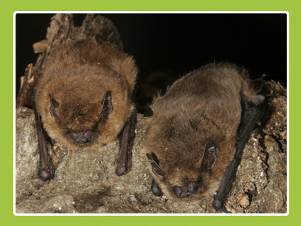BATS
Are bats protected?
- It is illegal to kill, injure, or disturb bats, obstruct access to bat roosts, or damage or disturb bat roosts. Bats may be a material consideration in considering a planning application proposal but only where a known bat roost is likely to be affected. Most bat roosts are in buildings in a good state of repair; old and dilapidated buildings are not favoured. Some bats roost in trees but generally large, old trees are favoured. Often, when bats are seen on a site proposed for development, they are using the area for feeding and are not living on the site. Developers must make every effort to safeguard bats and their roosts.
I have bats in my roof, are they a health hazard?
 | Bats often choose to live in the roof space or behind the soffit boards of houses, including modern buildings and bungalows. Some bats spend all year in a house roost; many others are present for only a few weeks each summer, when females need somewhere warm to raise their young. They do not cause damage to the roof or to the electric wiring, and their droppings, which are dry and crumbly, are not a health hazard. Picture: Pipestrelle Bats by Lee Morgan |
How can I find out more about bats?
- The Bat Conservation Trust is a good source of information.
- Find out more about the Island’s bats on Go Wild on Wight
Who do I contact if I find a grounded bat?
- Contact the Isle of Wight Bat Hospital Telephone 01983 406756 or 07771
Page last updated on: 04/11/2010





